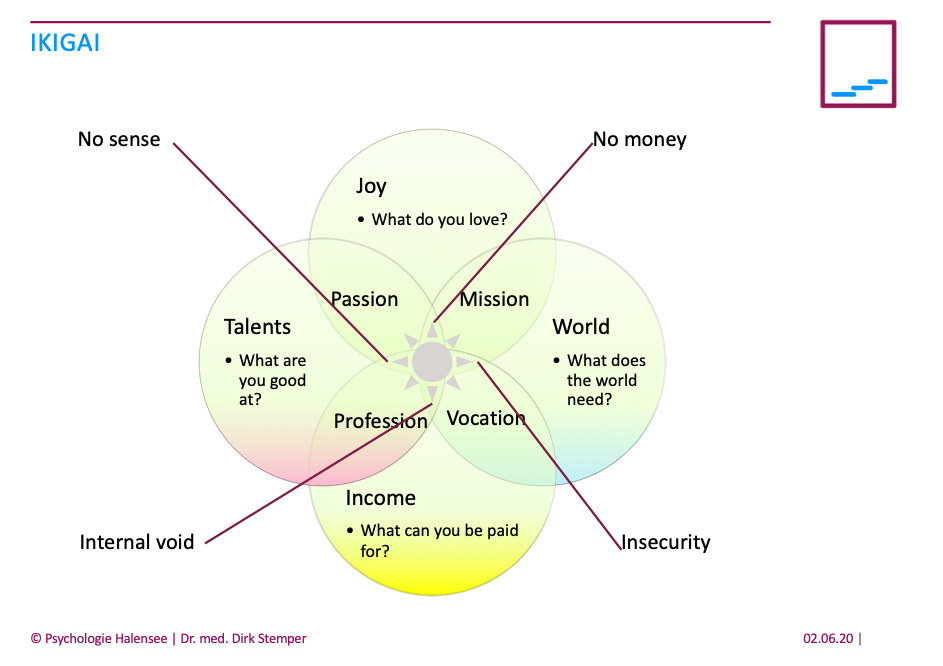IKIGAI – meaning of life
IKIGAI – meaning of life
According to Wikipedia, Ikigai (Japanese 生 き 甲 斐 meaning of life) is “… what it is worth living for”, “the joy and the goal of life” or, to put it loosely, “the feeling of having something that is worth it, in the morning to get up … ”
In Japanese culture, the term has a long history with changing meanings. Self-exploration in the pursuit and search for meaning in life has also played an important role in western thinking since ancient times. The anchoring of the meaning of life has been defined quite differently.
In Douglas Adams’ “The Hitchhiker’s Guide to the Galaxy”, the answer of the computer “Deep Thought” to the question of all questions, namely “of life, the universe and all the rest” is – after 7.5 million years of computing time – “42”.
In the end, the search for a meaning in life is an extremely personal process for every individual, and the result will vary greatly from person to person. If a person finds her Ikigai, it creates a feeling of zest for life and inner satisfaction. Even health and life expectancy are proven to be positively influenced by the meaning of life.
Possible application of the Ikigai
- Reorientation, change situations
- Search for the meaning of life
- Potential development and holistic goal setting
- Positioning at the beginning of a coaching
- Planning tool and compass for further coaching interventions
- Guide to the next steps
The four areas of Ikigai
According to Japanese philosophy, everyone has their own reason for a life worth living. Ikigai does not replace a meaningful life, nor does it fully cover the whole meaning of life. Rather, it describes the – completely self-centered – view of what is important to us, what makes us happy and happy. Yet, it is a good starting point in order to be mindful of ourselves and our environment.
Finding Ikigai requires patience and great sincerity with ourselves. At first, the areas of Ikigai seem easy to name. However, the meaning of the answers found depends on care and sincerity. Otherwise you run the risk of remaining enmeshed in navel gaze and self-deception.
Ikigai consists of four different subject areas:
1. What do we like to do?
2. What does the world need from us?
3. What can we make money with?
4. What are we good at?
Two neighboring areas each represent a superordinate basic area:
- Our inclinations and our benefits for the world result in our personal “mission”.
- Our “vocation” results from our contribution to the world and the opportunity to earn a living with it.
- Earning opportunities and talents and skills will result in our ideal job.
- What we are good at and what we like defines our great passion.
Where mission, vocation, profession and passion overlap, lies the path to our personal Ikigai.Find your personal Ikigai
Find a quiet, pleasant place where you are undisturbed. Take time for each area and listen to yourself.
Go through every area, and first write down all your ideas. In the second step, check each entry:
1. What do we like to do?
- Do you like it?
- Can you do it for a long time without getting tired?
- Have you enjoyed doing it before?
- Do you like to talk about it?
- Could you imagine doing it every day and all day long?
2. What does the world need from us?
- What does it change in the world?
- What values does it correspond to?
- Should it be remembered when you are gone?
- Would someone be missing if you could not do it for a while? What exactly would be missing?
- Where or who would it be missing concretely?
3. What can we make money with?
- Is it a job?
- Can you generate income with it?
- Do you have any additional income?
4. What are we good at?
- Is it a talent or a talent?
- Can you be the best with it?
- Did you learn it?
- Have others told you that you are good at it?
- Do you have other, perhaps unusual, skills?
Your personal Ikigai should emerge step by step. It will be important to repeat the consideration, on different days and in different moods. Complete your lists and take your time.

All areas are equally important, and the topic of money also plays a role in Ikigai. Not everything that we are good at is fun for us. Not everything we enjoy is paid for. That is the important finding behind Ikigai. What we want, what we are good at what we find important is not necessarily congruent with what is paid. In such cases, we feel empty, useless, insecure, or poor.
Tips:
- Do not block answers because they seem improper or unacceptable to you. If you lie in the sun all day and like to read a book, write that down. The higher-level basic areas and the Ikigai result from the intersections of the area.
- Also, preferences in which you feel less than perfect belong on the list as well. In the end, skills can be developed, for example through a course.
- Ideally, there is a goal, your personal Ikigai, which unites all areas. Make this goal as concrete as possible, e.g. B. what job and plan how you can achieve it.
And above all: persevere. Defeat is part of life.






